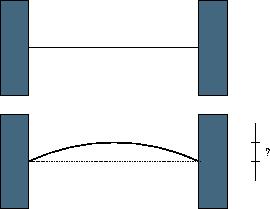poj1905--Expanding Rods(二分,精度伤不起啊)
来源:互联网 发布:淘宝老客户短信模板 编辑:程序博客网 时间:2024/05/17 10:07
Expanding Rods
Time Limit:1000MS Memory Limit:30000KB 64bit IO Format:%I64d & %I64u
Appoint description:
Description
 When a thin rod of length L is heated n degrees, it expands to a new length L'=(1+n*C)*L, where C is the coefficient of heat expansion.
When a thin rod of length L is heated n degrees, it expands to a new length L'=(1+n*C)*L, where C is the coefficient of heat expansion. When a thin rod is mounted on two solid walls and then heated, it expands and takes the shape of a circular segment, the original rod being the chord of the segment.
Your task is to compute the distance by which the center of the rod is displaced.
Input
The input contains multiple lines. Each line of input contains three non-negative numbers: the initial lenth of the rod in millimeters, the temperature change in degrees and the coefficient of heat expansion of the material. Input data guarantee that no rod expands by more than one half of its original length. The last line of input contains three negative numbers and it should not be processed.
Output
For each line of input, output one line with the displacement of the center of the rod in millimeters with 3 digits of precision.
Sample Input
1000 100 0.000115000 10 0.0000610 0 0.001-1 -1 -1
Sample Output
61.329225.0200.000
题意:题意很简单,计算膨胀后中点上升的高度(膨胀后变为一个圆弧)
二分上升的高度,最小为0,最大小于l/2 , 枚举每一个x,带入公式中验证。
从三角形的公式中可以推出 r = l*l/(8*x) + x/2 ;
圆心角 = 2 * r * asin(l/(2.0*r)) ;
有了半径和圆心角就可以验证弧长对不对了。最终得到结果
注意:公式只能是这两个。。。。其他的公式(比如 sqrt(r*r - (l/2)*(l/2)) + x = r , 圆心角 = acos( 1 - l*l/(2*r*r) ) )这些公式都会损失精度,至于为毛损失,天知道
#include <cstdio>#include <cstring>#include <algorithm>#include <cmath>using namespace std ;#define eqs 1e-8double solve(double l,double x){ double r , new_l ; r = l*l/(8.0*x) + x/2.0 ; new_l = 2 * r * asin(l/(2.0*r)) ; return new_l ;}int main(){ double l , n , c , new_l , temp , last ; while( scanf("%lf %lf %lf", &l, &n, &c) != EOF ) { if( l+n+c+3.0 < eqs ) break ; new_l = (1.0 + n*c) * l ; if( l == 0 || n == 0 || c == 0 ) { printf("0.000\n") ; continue ; } double low , high , mid ; low = 0 ; high = l/2.0 ; while( high - low > eqs ) { mid = ( high + low ) / 2.0 ; temp = solve(l,mid) ; if( new_l - temp >= eqs ) { last = mid ; low = mid ; } else high = mid ; } printf("%.3lf\n", last) ; } return 0;} 0 0
- poj1905--Expanding Rods(二分,精度伤不起啊)
- POJ1905 Expanding Rods 二分
- poj1905 Expanding Rods 二分
- 二分 poj1905 Expanding Rods
- Expanding Rods(二分POJ1905)
- POJ1905 Expanding Rods(二分)
- poj1905 Expanding Rods(二分+几何)
- 【POJ1905】Expanding Rods 二分答案+推公式
- 【poj1905】Expanding Rods——二分
- POJ1905:Expanding Rods
- POJ1905 Expanding Rods
- POJ1905--Expanding Rods
- POJ1905 Expanding Rods
- poj1905 Expanding Rods
- POJ1905 Expanding Rods
- POJ1905-Expanding Rods - 二分法。
- POJ1905-----Expanding Rods
- Expanding Rods<poj1905>
- 1.Android中解析json程序代码
- 存储过程
- DOM4J开发教程
- UVA 10739--String to Palindrome +dp
- 电脑用无线网卡上网的同时用有线上站点
- poj1905--Expanding Rods(二分,精度伤不起啊)
- Eqs 哈希
- 重载与重写,继承与多态
- jsp 常用标签
- 程序集引用版本冲突问题的解决办法:合并依赖项
- linux下使用yum安装mysql
- contiki 源码分析之platform(一)(platform / cc2530dk)
- POJ 3273 Monthly Expense (二分)
- OpenCV+KMeans算法


